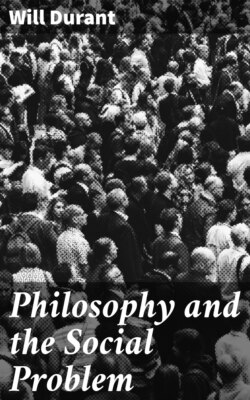Читать книгу Philosophy and the Social Problem - Уилл Дюрант - Страница 11
На сайте Литреса книга снята с продажи.
V
Intelligence as Virtue
ОглавлениеINTELLIGENCE as virtue: it was not a new doctrine; it was merely a new emphasis placed on an already important element in the Greek—or rather the Athenian—view of life. But it was a needed emphasis. The Sophists (not Socrates, pace Cicero) had brought philosophy down from heaven to earth, but they had left it grovelling at the feet of business efficiency and success, a sort of ancilla pecuniæ, a broker knowing where one’s soul could be invested at ten per cent. Socrates agreed with the Sophists in condemning any but a very temporary devotion to metaphysical abstractions—the one and the many, motion and rest, the indivisibility of space, the puzzles of predication, and so forth; he joined them in ridiculing the pursuit of knowledge for its own sake, and in demanding that all thinking should be focussed finally on the real concerns of life; but his spirit was as different from theirs as the spirit of Spinoza was different from that of a mediæval money-lender. With the Sophists philosophy was a profession; they were “lovers of wisdom”—for a consideration. With Socrates philosophy was a quest of the permanently good, of the lastingly satisfying attitude to life. To find out just what are justice, temperance, courage, piety—“that is an inquiry which I shall never be weary of pursuing so far as in me lies.” It was not an easy quest; and the results were not startlingly definite: “I wander to and fro when I attempt these problems, and do not remain consistent with myself.” His interlocutors went from him apparently empty; but he had left in them seed which developed in the after-calm of thought. He could clarify men’s notions, he could reveal to them their assumptions and prejudices; but he could not and would not manufacture opinions for them. He left no written philosophy because he had only the most general advice to give, and knew that no other advice is ever taken. He trusted his friends to pass on the good word.
Now what was the good word? It was, first of all, the identity of virtue and wisdom, morals and intelligence; but more than that, it was the basic identity, in the light of intelligence, of communal and individual interests. Here at the Sophist’s feet lay the débris of the old morality. What was to replace it? The young Athenians of a generation denuded of supernatural belief would not listen to counsels of “virtue,” of self-sacrifice to the community. What was to be done? Should social and political pressure be brought to bear upon the Sophists to compel them to modify the individualistic tenor of their teachings? Analysis destroys morals. What is the moral—destroy analysis?
The moral, answered Socrates, is to get better morals, to find an ethic immune to the attack of the most ruthless sceptic. The Sophists were right, said Socrates; morality means more than social obedience. But the Sophists were wrong in opposing the good of the individual to that of the community; Socrates proposed to prove that if a man were intelligent, he would see that those same qualities which make a man a good citizen—justice, wisdom, temperance, courage—are also the best means to individual advantage and development. All these “virtues” are simply the supreme and only virtue—wisdom—differentiated by the context of circumstance. No action is virtuous unless it is an intelligent adaptation of means to a criticised end. “Sin” is failure to use energy to the best account; it is an unintelligent waste of strength. A man does not knowingly pursue anything but the Good; let him but see his advantage, and he will be attracted towards it irresistibly; let him pursue it, and he will be happy, and the state safe. The trouble is that men lack perspective, and cannot see their true Good; they need not “virtue” but intelligence, not sermons but training in perspective. The man who has ἑνκρἁτεια, who rules within, who is strong enough to stop and think, the man who has achieved σωφροσὑνη—the self-knowledge that brings self-command—such a man will not be deceived by the tragedy of distance, by the apparent smallness of the future good alongside of the more easily appreciable good that lies invitingly at hand. Hence the moral importance of dialectic, of cross-examination, of concept and definition: we must learn “how to make our ideas clear”; we must ask ourselves just what it is that we want, just how real this seeming good is. Dialectic is the handmaiden of virtue; and all clarification is morality.
